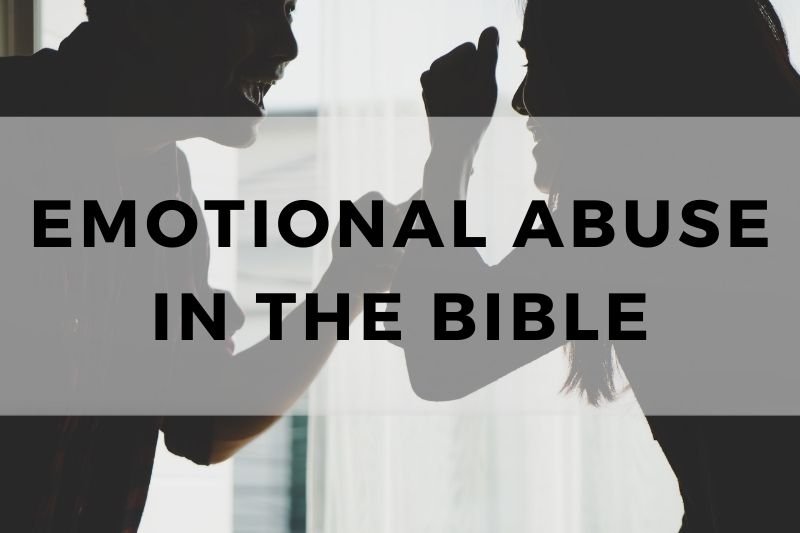
The Bible includes stories that reveal the depths of human experiences, including the darker aspects of humanity such as emotional abuse. It portrays real-life instances of mistreatment, manipulation, and neglect.
These stories resonate across time, offering insights into the complexities of relationships and the consequences of harmful behavior that are just as relevant today. So let’s review examples of emotional abuse in the Bible to better understand human nature and help improve our interactions with others.
Stories of Emotional Abuse in the Bible
#1. King Saul’s Treatment of David (1 Samuel 18-31)
King Saul’s jealousy towards David is a stark example of emotional abuse in the Bible. Despite David’s loyalty and service, Saul’s resentment grows, leading to numerous attempts on David’s life. In 1 Samuel 18:10-11, it states: “The next day an evil spirit from God came forcefully on Saul. He was prophesying in his house, while David was playing the lyre, as he usually did. Saul had a spear in his hand and he hurled it, saying to himself, ‘I’ll pin David to the wall.’ But David eluded him twice.” Saul’s erratic behavior and attempts to harm David reveal the destructive nature of unchecked jealousy and insecurity.
#2. The Treatment of Hagar by Sarah (Genesis 16)
Hagar, Sarah’s maidservant, faces mistreatment and exploitation in Genesis 16. When Sarah is unable to conceive, she gives Hagar to Abraham as a surrogate. However, when Hagar becomes pregnant, Sarah’s jealousy leads to abuse. In Genesis 16:6, it states: “Your servant is in your hands,” Abram said. “Do with her whatever you think best.” Then Sarai mistreated Hagar; so she fled from her. Sarah’s mistreatment of Hagar highlights the power dynamics and cruelty that can arise from jealousy and desperation.
#3. Jacob’s Favoritism and Deception (Genesis 37)
Jacob’s favoritism towards Joseph triggers resentment and hostility among his other sons, leading to emotional abuse and betrayal. In Genesis 37:4, it states: “When his brothers saw that their father loved him more than any of them, they hated him and could not speak a kind word to him.” Jacob’s blatant favoritism creates a toxic family dynamic, fueling animosity and eventually leading to Joseph’s sale into slavery. This story underscores the damaging effects of parental favoritism and its role in breeding resentment and division within families.
#4. Job’s Friends (Job 2-31)
Job’s friends, while initially offering comfort, eventually contribute to his suffering through their accusations and misguided attempts to explain his hardships. In Job 16:2, it states: “I have heard many things like these; you are miserable comforters, all of you!” Instead of providing solace, they heap blame upon Job, suggesting his suffering is a result of his sins. Their judgmental attitudes and lack of empathy highlight the harm that can come from offering simplistic explanations for complex human experiences.
#5. Leah and Rachel’s Rivalry (Genesis 29-30)
Leah and Rachel’s rivalry over Jacob’s affection results in emotional turmoil and manipulation. In Genesis 30:1, it states: “When Rachel saw that she was not bearing Jacob any children, she became jealous of her sister. So she said to Jacob, ‘Give me children, or I’ll die!'” Leah, who is able to bear children, uses her fertility as a means to compete with Rachel for Jacob’s love. This competition fosters bitterness and resentment between the sisters, illustrating the destructive nature of jealousy and rivalry within families.
#6. The Treatment of Tamar by Amnon (2 Samuel 13)
Tamar, the sister of Absalom, experiences emotional abuse at the hands of her half-brother Amnon. In 2 Samuel 13:14, it states: “But he refused to listen to her, and since he was stronger than she, he raped her.” Amnon’s actions not only violate Tamar’s autonomy and dignity but also result in her profound emotional trauma. This account sheds light on the devastating impact of sexual violence and abuse within families.
#7. The Pharisees’ Treatment of the Blind Man (John 9)
In John 9, the Pharisees’ treatment of a man born blind exemplifies emotional abuse through their questioning and disbelief. Despite the man’s testimony of being healed by Jesus, the Pharisees interrogate him and his parents, casting doubt on his experience. In John 9:34, it states: “To this they replied, ‘You were steeped in sin at birth; how dare you lecture us!’ And they threw him out.” The Pharisees’ refusal to acknowledge the man’s miraculous healing reflects their pride and spiritual blindness, perpetuating emotional harm through their condemnation and rejection.
#8. Jesus’ Confrontation with the Pharisees (Matthew 23, John 8)
Jesus confronts the Pharisees’ hypocrisy and legalism, exposing the emotional abuse inherent in their religious practices. In Matthew 23:4, Jesus criticizes the Pharisees, saying, “They tie up heavy, cumbersome loads and put them on other people’s shoulders, but they themselves are not willing to lift a finger to move them.” Jesus denounces their oppressive teachings and self-righteous attitudes, highlighting the harm caused by spiritual manipulation and control. In John 8:7, Jesus challenges the Pharisees’ hypocrisy, declaring, “Let any one of you who is without sin be the first to throw a stone at her.” Jesus’ confrontation underscores the importance of authenticity and compassion over judgment and condemnation.
Closing Thoughts
The stories of emotional abuse in the Bible serve as poignant reminders of the complexities of human relationships and the prevalence of suffering in our world. Through these narratives, we witness the devastating consequences of jealousy, manipulation, neglect, and judgment. However, amidst the darkness, there is also hope, as these stories offer opportunities for reflection, growth, and ultimately, redemption. By learning from the mistakes and shortcomings depicted in these accounts, we are challenged to cultivate compassion, empathy, and grace in our interactions with others, striving to create relationships characterized by love, respect, and understanding.
